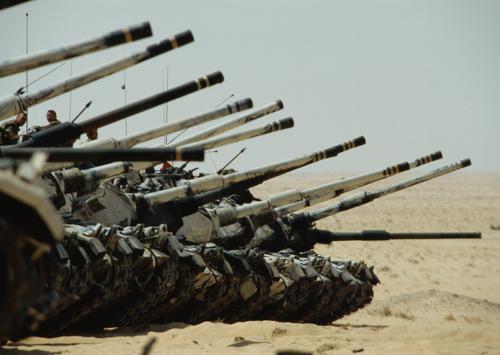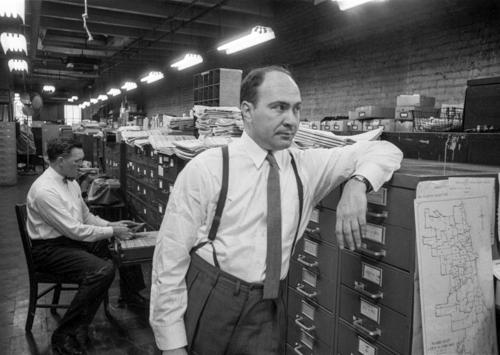Listen to New Voices on Studs Terkel our partnership with 826CHI-here! Read the Story
Showing 1 - 14 of 14 results
-
Seymour Melman discusses his book "Pentagon Capitalism: The Political Economy of War"
Jun. 8, 1970 Seymour Melman discusses his book "Pentagon Capitalism: The Political Economy of War." Topics of discussion include the military-industrial complex and the state management of industry, particularly in regards to defense.
-
Robert Del Tredici discusses his book "At Work in the Fields of the Bomb"
Jun. 6, 1988 Robert del Tredici photographer, artist, and author discusses the history of nuclear weapon production plants around the United States and the effects of nuclear radiation.
-
Richard Lewis discusses nuclear energy and the politics and dangers surrounding it
1970 Richard Lewis discusses nuclear energy, the Joint Committee on Atomic Energy, pollution, and his book "Nuclear Power Rebellion".
-
Panel discusses nuclear warfare and its consequences
Jun. 19, 1981 Discussing nuclear armageddon and the medical consequences of nuclear war with panel Herbert Scoville, George Kistiakowsky, Dr. Jack Geiger and Dr. Quentin Young.
-
Julia Koscis discusses her family's daily work and life ; part 4
Julia Koscis discusses being an immigrant, racism and daily life. She talks with Studs about her fears of African Americans upon arriving at Ellis Island, New York from Hungary, and living closely with them before moving on to Dayton, Ohio. She discusses some of her life before moving to Chicago from Dayton, Ohio.
-
Interview with Dr. Helen Caldicott
Mar. 8, 1984 Discussing the book "Missile Envy: The Arms Race and Nuclear War," (published by Murrow) with the author, humanist and physician Dr. Helen Caldicott. Program also includes the opening of Studs' inaugural address.
-
Four peace marchers discuss The Continental Walk
Sam Day, Susan McFlan, Bernie Novan and Seldon Osbourne are all participants of The Continental Walk for disarmament and social justice. They're taking part in the walk to make the public aware of how much money is put into military and nuclear weapons. As a group, they feel strongly about not wanting people's lives and their worlds to blow up around them.
-
Dr. Robert Jay Lifton discusses the psychological impact of the nuclear arms race
1980 Dr. Robert Jay Lifton, psychiatrist and psycho-historian, discusses the acceptance and embrace of nuclear disaster, doctors' opposition to nuclear weapons, difference in Americans' and Europeans' opposition to nuclear weapons, psychological impact of nuclear bombings in Japan, and the mental disconnect experienced by those who build atomic weapons who then see the bombs' effects.
-
Dr. George Wald discusses the have and the have nots of society
Oct. 12, 1974 Interviewing Dr. George Wald, Professor of Biology at Harvard University, who often spoke on the social aspects of science, human ecology, and the environment.
-
Daniel Yergin discusses his book, "Shattered Peace: The Origins of the Cold War and the National Security State"
1970 Daniel Yergin, author and economic historian, discusses his book, "Shattered Peace: The Origins of the Cold War and the National Security State." He explains the key players in the Cold War and his thoughts on the Yalta and Riga Axioms. Yergin also explores the end of World War II and other events that led to the tensions between US and the Soviet Union.
-
Daniel Ellsberg Discusses the publication of "The Pentagon Papers" ; part 1
1980 Daniel Ellsberg, political activist and former military analyst, discuses his release of the Pentagon Papers and his thoughts on how the Vietnam War played out. He also discusses what he believes the next war could look like and how America, and the world, would be affected by nuclear war.
-
Daniel Ellsberg discusses his family and his beliefs about the hydrogen bomb ; part 2
Dec. 31, 1979 Daniel Ellsberg, political activist, discusses the creation and use of the atomic and hydrogen bombs. He discusses his family including how his son helped him leak the Pentagon Papers and has since protested with him, including being jailed. He also talks about his father who quit his job over the creation of the hydrogen bomb and how his father's choice helped him to decide to release the Pentagon Papers.
-
Blanche Wiesen Cook discusses her book, "The Declassified Eisenhower: A Divided Legacy of Peace and Political Warfare"
Aug. 6, 1981 Blanche Wiesen Cook, historian, professor, and author discusses her book, "The Declassified Eisenhower," and explains Eisenhower's peace and war beliefs. She describes his beliefs at the end of World War II and his relationships with fellow generals and leaders.




